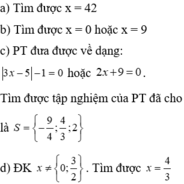Giải phương trình 3x^4 _ 12x^2 + 9 = 0
KA
Những câu hỏi liên quan
Giải các phương trình sau:
a \(x^4=5x^2+2x-3\)
b \(x^4=6x^2+12x+10\)
c \(3x^3+3x^2+3x=-1\)
d \(8x^3-12x^2+6x-5=0\)
Giải các phương trình sau:a)
2
x
−
10
4
−
5
2
x
−
3
6
;
b)
x
−
9
2
+
x
2
−
81...
Đọc tiếp
Giải các phương trình sau:
a) 2 x − 10 4 − 5 = 2 x − 3 6 ;
b) x − 9 2 + x 2 − 81 = 0 ;
c) 3 x − 5 − 1 2 x + 9 = 0 ;
d) 1 2 x − 3 − 5 x = 3 2 x 2 − 3 x .
giải phương trình sau:
a)\(\sqrt{x^2-9}\) - 3\(\sqrt{x-3}\) =0 b)\(\sqrt{4x^2-12x+9}\) =x - 3
c)\(\sqrt{x^2+6x+9}\) =3x-1
a)√x2−9 - 3√x−3 =0
<=> (√x-3)(√x+3)-3√x-3=0
<=> (√x-3)(√x+3-3)=0
<=> (√x-3)√x=0
<=> √x-3=0
<=>x=9
b)√4x2−12x+9=x - 3
<=> √(2x -3)2 =x-3
<=> 2x-3=x-3
<=>2x-x=-3+3
<=>x=0
c)√x2+6x+9=3x-1
<=> √(x+3)2 =3x-1
<=> x+3=3x-1
<=> -2x=-4
<=> x=2
Nhớ cho mình 1 tim nha bạn
Đúng 2
Bình luận (1)
Lời giải:
a. ĐKXĐ: $x\geq 3$
PT $\Leftrightarrow \sqrt{(x-3)(x+3)}-3\sqrt{x-3}=0$
$\Leftrightarrow \sqrt{x-3}(\sqrt{x+3}-3)=0$
$\Leftrightarrow \sqrt{x-3}=0$ hoặc $\sqrt{x+3}-3=0$
$\Leftrightarrow \sqrt{x-3}=0$ hoặc $\sqrt{x+3}=3$
$\Leftrightarrow x=3$ hoặc $x=6$ (tm)
b.
PT \(\Rightarrow \left\{\begin{matrix} x-3\geq 0\\ 4x^2-12x+9=(x-3)^2=x^2-6x+9\end{matrix}\right.\Leftrightarrow \left\{\begin{matrix} x\geq 3\\ 3x^2-6x=0\end{matrix}\right.\)
\(\Leftrightarrow \left\{\begin{matrix} x\geq 3\\ 3x(x-2)=0\end{matrix}\right.\)
$\Rightarrow$ không có giá trị $x$ nào thỏa mãn
Vậy pt vô nghiệm.
c.
PT \(\Rightarrow \left\{\begin{matrix} 3x-1\geq 0\\ x^2+6x+9=(3x-1)^2\end{matrix}\right.\Leftrightarrow \left\{\begin{matrix} x\geq \frac{1}{3}\\ x^2+6x+9=9x^2-6x+1\end{matrix}\right.\)
\(\Leftrightarrow \left\{\begin{matrix} x\geq \frac{1}{3}\\ 8x^2-12x-8=0\end{matrix}\right.\Leftrightarrow \left\{\begin{matrix} x\geq \frac{1}{3}\\ 4(x-2)(2x+1)=0\end{matrix}\right.\Leftrightarrow x=2\)
Đúng 0
Bình luận (0)
giúp mình giải phương trình với
a, 9(2x=1)=4(x-5)^2
b,x^3-4x^2-12x+27=0
c,x^3+3x^2-6x-8=0
\(a,9\left(2x+1\right)=4\left(x-5\right)^2\)
\(4x^2-40x+100=18x+9\)
\(4x^2-58x+91=0\)
\(\Rightarrow\orbr{\begin{cases}x=\frac{29+3\sqrt{53}}{4}\\x=\frac{29-3\sqrt{53}}{4}\end{cases}}\)
\(b,x^3-4x^2-12x+27=0\)
\(\left(x+3\right)\left(x^2-7x+9\right)=0\)
\(\Rightarrow\orbr{\begin{cases}x+3=0\\x^2-7x+9=0\end{cases}\Rightarrow\orbr{\begin{cases}x=-3\\x=\frac{7\pm\sqrt{13}}{2}\end{cases}}}\)
\(c,x^3+3x^2-6x-8=0\)
\(\left(x+4\right)\left(x-2\right)\left(x+1\right)=0\)
\(Th1:x+4=0\Leftrightarrow x=-4\)
\(Th2:x-2=0\Leftrightarrow x=2\)
\(Th3:x+1=0\Leftrightarrow x=-1\)
\(a,9.\left(2x+1\right)=4.\left(x-5\right)^2\)
\(< =>4x^2-40x+100=18x+9\)
\(< =>4x^2+58x+91=0\)
\(< =>\orbr{\begin{cases}x=\frac{29-3\sqrt{53}}{4}\\x=\frac{29+3\sqrt{53}}{4}\end{cases}}\)
\(b,x^3-4x^2-12x+27=0\)
\(< =>\left(x+3\right)\left(x^2-7x+9\right)=0\)
\(< =>\orbr{\begin{cases}x+3=0\\x^2-7x+9=0\end{cases}}\)
\(< =>\orbr{\begin{cases}x=-3\\x=\frac{7\pm\sqrt{13}}{2}\end{cases}}\)
Giải các phương trình:
a) 3x4 - 12x2 + 9 = 0; b) 2x4 + 3x2 - 2 = 0; c) x4 + 5x2 + 1 = 0.
a). Đặt \(x^2=y\) \(\left(y\ge0\right)\) ta có ;
\(3y^2-12y+9=0\)
\(\Leftrightarrow y^2-4y+3=0\)
Nhận xét : \(a+b+c=1+\left(-4\right)+3=0\)
\(\Rightarrow y_1=1\) (TM \(y\ge0\))
\(y_2=\dfrac{3}{1}=3\)
Với \(y=y_1=1\Rightarrow x^2=1\Leftrightarrow x_1=1;x_2=-1\)
Với \(y=y_2=3\Rightarrow x^2=3\Leftrightarrow x_3=\sqrt{3};x_4=-\sqrt{3}\)
Vậy \(x_1=1;x_2=-1;x_3=\sqrt{3};x_4=-\sqrt{3}\) là các giá trị cần tìm
b) . Đặt \(x^2=y\) \(\left(y\ge0\right)\) ta có ;
\(2y^2+3y-2=0\)
\(\Delta_y=3^2-4\cdot2\cdot\left(-2\right)=9+16=25\) \(\left(\sqrt{\Delta}=5\right)\)
Vì \(\Delta>0\) nên pt có 2 nghiệm phân biệt
\(\Rightarrow\)\(y_1=\dfrac{-3+5}{2\cdot2}=\dfrac{1}{2}\) (TM \(y\ge0\) )
\(y_2=\dfrac{-3-5}{2\cdot2}=-2\) (KTM \(y\ge0\) )
Với \(y=y_1=\dfrac{1}{2}\Rightarrow x^2=\dfrac{1}{2}\Leftrightarrow x_1=\dfrac{1}{4};x_2=-\dfrac{1}{4}\)
Vậy \(x_1=\dfrac{1}{4};x_2=-\dfrac{1}{4}\) là các giá trị cần tìm
c) Đặt \(x^2=y\) \(\left(y\ge0\right)\) ta có ;
\(y^2+5y+1=0\)
\(\Delta_y=5^2-4\cdot1\cdot1=25-4=21\)
Vì \(\Delta>0\) nên pt có 2 nghiệm phân biệt
\(\Rightarrow y_1=\dfrac{-5+\sqrt{21}}{2\cdot1}=\dfrac{-5+\sqrt{21}}{2}\) (KTM \(y\ge0\))
\(y_2=\dfrac{-5-\sqrt{21}}{2\cdot1}=\dfrac{-5-\sqrt{21}}{2}\) (KTM \(y\ge0\))
Vậy pt đã cho vô nghiệm
Đúng 0
Bình luận (1)
Giải các phương trình sau:
a. \(5x^2+10x=0\)
b. \(3x^2-12=0\)
c. \(3x^2+7=0\)
d. \(12x^2-3x=0\)
giải các phương trình sau:1,sqrt{18x}-6sqrt{dfrac{2x}{9}}3-sqrt{dfrac{x}{2}}2,sqrt{3x}-2sqrt{12x}+dfrac{1}{3}sqrt{27x}-43, 3sqrt{2x}+5sqrt{8x}-20-sqrt{18}04,sqrt{16x+16}-sqrt{9x+9}15,sqrt{4left(1-3xright)}+sqrt{9left(1-3xright)}106,dfrac{2}{3}sqrt{x-3}+dfrac{1}{6}sqrt{x-3}-sqrt{x-3}dfrac{-2}{3}
Đọc tiếp
giải các phương trình sau:
\(1,\sqrt{18x}-6\sqrt{\dfrac{2x}{9}}=3-\sqrt{\dfrac{x}{2}}\)
\(2,\sqrt{3x}-2\sqrt{12x}+\dfrac{1}{3}\sqrt{27x}=-4\)
3, \(3\sqrt{2x}+5\sqrt{8x}-20-\sqrt{18}=0\)
\(4,\sqrt{16x+16}-\sqrt{9x+9}=1\)
\(5,\sqrt{4\left(1-3x\right)}+\sqrt{9\left(1-3x\right)}=10\)
\(6,\dfrac{2}{3}\sqrt{x-3}+\dfrac{1}{6}\sqrt{x-3}-\sqrt{x-3}=\dfrac{-2}{3}\)
2: ĐKXĐ: x>=0
\(\sqrt{3x}-2\sqrt{12x}+\dfrac{1}{3}\cdot\sqrt{27x}=-4\)
=>\(\sqrt{3x}-2\cdot2\sqrt{3x}+\dfrac{1}{3}\cdot3\sqrt{3x}=-4\)
=>\(\sqrt{3x}-4\sqrt{3x}+\sqrt{3x}=-4\)
=>\(-2\sqrt{3x}=-4\)
=>\(\sqrt{3x}=2\)
=>3x=4
=>\(x=\dfrac{4}{3}\left(nhận\right)\)
3:
ĐKXĐ: x>=0
\(3\sqrt{2x}+5\sqrt{8x}-20-\sqrt{18}=0\)
=>\(3\sqrt{2x}+5\cdot2\sqrt{2x}-20-3\sqrt{2}=0\)
=>\(13\sqrt{2x}=20+3\sqrt{2}\)
=>\(\sqrt{2x}=\dfrac{20+3\sqrt{2}}{13}\)
=>\(2x=\dfrac{418+120\sqrt{2}}{169}\)
=>\(x=\dfrac{209+60\sqrt{2}}{169}\left(nhận\right)\)
4: ĐKXĐ: x>=-1
\(\sqrt{16x+16}-\sqrt{9x+9}=1\)
=>\(4\sqrt{x+1}-3\sqrt{x+1}=1\)
=>\(\sqrt{x+1}=1\)
=>x+1=1
=>x=0(nhận)
5: ĐKXĐ: x<=1/3
\(\sqrt{4\left(1-3x\right)}+\sqrt{9\left(1-3x\right)}=10\)
=>\(2\sqrt{1-3x}+3\sqrt{1-3x}=10\)
=>\(5\sqrt{1-3x}=10\)
=>\(\sqrt{1-3x}=2\)
=>1-3x=4
=>3x=1-4=-3
=>x=-3/3=-1(nhận)
6: ĐKXĐ: x>=3
\(\dfrac{2}{3}\sqrt{x-3}+\dfrac{1}{6}\sqrt{x-3}-\sqrt{x-3}=-\dfrac{2}{3}\)
=>\(\sqrt{x-3}\cdot\left(\dfrac{2}{3}+\dfrac{1}{6}-1\right)=-\dfrac{2}{3}\)
=>\(\sqrt{x-3}\cdot\dfrac{-1}{6}=-\dfrac{2}{3}\)
=>\(\sqrt{x-3}=\dfrac{2}{3}:\dfrac{1}{6}=\dfrac{2}{3}\cdot6=\dfrac{12}{3}=4\)
=>x-3=16
=>x=19(nhận)
Đúng 1
Bình luận (0)
Giải các phương trình:a)
3
x
−
3
4
−
2
−
4
x
0
;b)
x
2
−
4
x
+
7...
Đọc tiếp
Giải các phương trình:
a) 3 x − 3 4 − 2 − 4 x = 0 ;
b) x 2 − 4 x + 7 − 12 x + 7 = 0 ;
c) 4 − 4 + x + x x 2 − 16 = 0 ;
d) x 2 + 6 x − 7 = 0 .
giải các phương trình sau
a. \(2\sqrt{12x}-3\sqrt{3x}+4\sqrt{48x}=17\)
b. \(\sqrt{x^2-6x+9}=1\)
a.\(2\sqrt{12x}-3\sqrt{3x}+4\sqrt{48x}=17\)
=>\(4\sqrt{3x}-3\sqrt{3x}+16\sqrt{3x}=17\)
=>\(17\sqrt{3x}=17\)
=>\(\sqrt{3x}=1\)
=>\(x=\dfrac{1}{3}\)
Đúng 1
Bình luận (0)
b.Ta có:\(\sqrt{x^2-6x+9}=1\)
=>\(\sqrt{\left(x-3\right)^2}=1\)
=>\(\left|x-3\right|=1\)
Vậy có hai trường hợp:
TH1:\(x-3=1\)
=>\(x=4\)
TH2:\(x-3=-1\)
=>\(x=2\)
Đúng 1
Bình luận (0)
a) ĐKXĐ: \(x\ge0\)
Ta có: \(2\sqrt{12x}-3\sqrt{3x}+4\sqrt{48x}=17\)
\(\Leftrightarrow2\cdot2\cdot\sqrt{3x}-3\cdot\sqrt{3x}+4\cdot4\cdot\sqrt{3x}=17\)
\(\Leftrightarrow4\sqrt{3x}-3\sqrt{3x}+16\sqrt{3x}=17\)
\(\Leftrightarrow17\sqrt{3x}=17\)
\(\Leftrightarrow\sqrt{3x}=1\)
\(\Leftrightarrow3x=1\)
hay \(x=\dfrac{1}{3}\)(nhận)
Vậy: \(S=\left\{\dfrac{1}{3}\right\}\)
b) ĐKXĐ: \(x\in R\)
Ta có: \(\sqrt{x^2-6x+9}=1\)
\(\Leftrightarrow\sqrt{\left(x-3\right)^2}=1\)
\(\Leftrightarrow\left|x-3\right|=1\)
\(\Leftrightarrow\left[{}\begin{matrix}x-3=1\\x-3=-1\end{matrix}\right.\Leftrightarrow\left[{}\begin{matrix}x=4\left(nhận\right)\\x=2\left(nhận\right)\end{matrix}\right.\)
Vậy: S={2;4}
Đúng 0
Bình luận (0)




